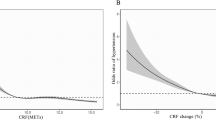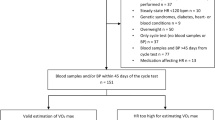Abstract
Objective:
To investigate the relationship between cardio/respiratory fitness (CRF) and metabolic syndrome (MS) in young Korean men. Design: In a cross-sectional study, we examined 909 young Korean men (mean&177;SD age, 24.0&177;2 years) who were healthy and not taking any medications affecting blood pressure, glucose, or lipids concentrations. Body fatness, resting blood pressures, and fasting blood levels of lipids, glucose, and insulin were measured with our standardized laboratory protocols. CRF was quantified as the maximum volume of minute oxygen consumption measured during a graded treadmill test. Metabolic syndrome was defined with the National Cholesterol Education Program Adult Treatment Panel III criteria and a modified cut-off value of waist circumference from the Asia-Pacific Perspective: Redefining Obesity and its Treatment.
Results:
Group analyses showed significant and inverse dose-response trends between the metabolic syndrome markers and CRF levels such that men with high and moderate CRF levels had more favorable profiles in body fatness, resting blood pressures, mean values in fasting lipids, glucose, and insulin, and homeostasis model of assessment-insulin resistance than men with low CRF level. After adjusting for several potential confounders such as age, smoking, and body fatness variables, the low and moderate CRF groups had odds of 4.64 (95% CI, 2.00 to 10.79) and 2.57 (95% CI, 1.04 to 6.34) for having metabolic syndrome than the high CRF group. Conclusion: These findings suggest that low CRF is a significant and independent risk factor for metabolic syndrome in young Korean men.
Similar content being viewed by others
Article PDF
Author information
Authors and Affiliations
Rights and permissions
About this article
Cite this article
Kang, HS., Park, SH. & Kim, S. Low Cardiorespiratory Fitness is an Independent Predictor of Metabolic Syndrome in Young Korean Adults. Nat Prec (2008). https://doi.org/10.1038/npre.2008.2236.1
Received:
Accepted:
Published:
DOI: https://doi.org/10.1038/npre.2008.2236.1



